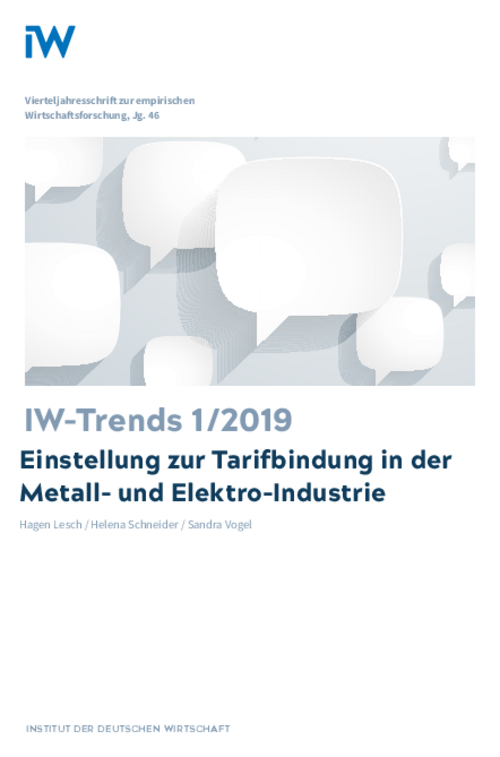A survey of 1,553 companies in the metal and electrical industry about their attitude to binding collective bargaining shows that two thirds of these firms are satisfied with their binding sector-level agreements.

Results of a Company Survey: Attitudes Towards Binding Collective Bargaining in the Metal and Electrical Industry
IW-Trends

A survey of 1,553 companies in the metal and electrical industry about their attitude to binding collective bargaining shows that two thirds of these firms are satisfied with their binding sector-level agreements.
Among enterprises with a firm-level agreement, this number rises to 80 per cent. Companies bound by a sector-level agreement are critical of pay levels – especially for low-skilled jobs – the privileges for older employees and the working-time arrangements. For companies which do not subscribe to the collective bargaining process, pay levels and working-time arrangements are their main reasons for opting out. However, many such firms none the less base their working conditions on individual provisions of the relevant sector-level agreement. If collective bargaining is to be strengthened, the bargaining parties must tackle the critical provisions of sector-level agreements and emphasise their flexibility. The statutory extension of collective agreements to cover non-signatory companies, on the other hand, would make their adoption mandatory without addressing the real problems they present.

Hagen Lesch / Helena Schneider / Sandra Vogel: Einstellung zur Tarifbindung in der Metall- und Elektro-Industrie – Ergebnisse einer Unternehmensbefragung
IW-Trends

More on the topic

The 9th IW Survey of Further Training
In 2016 some 85 per cent of companies in Germany were active in continuing vocational training, using a broad mix of methods.
IW
Has the German Economy Reached its Limit?: Skilled Labour Shortages as a Brake on Growth
The German economy is performing significantly better than was expected in the first few months of this year. During the course of 2017, certain early fears – especially of a weakening of the global economy due to increasing protectionism – have proved ...
IW